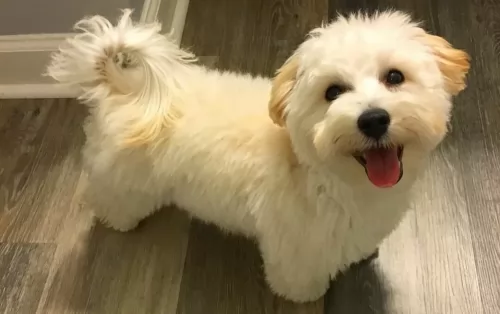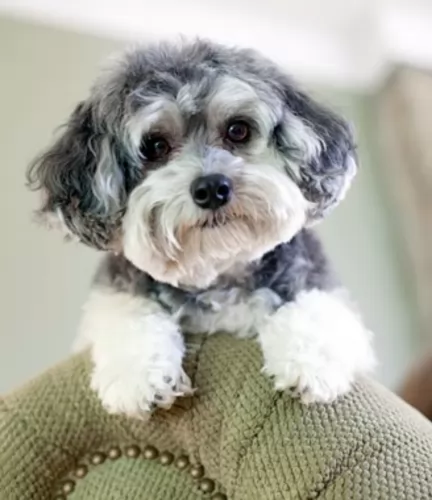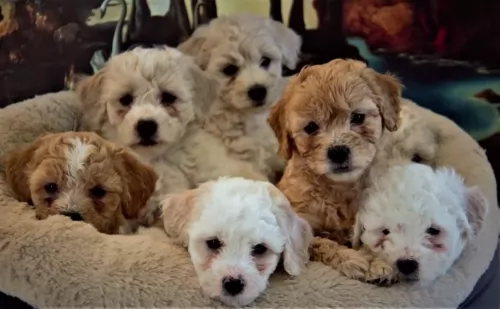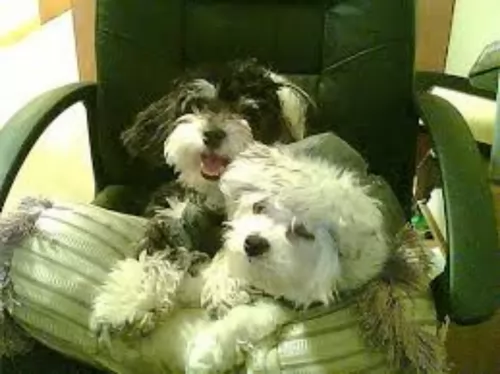 Petzlover
Petzlover Maltese is originated from Italy but Maltipoo is originated from United States. Maltese may grow 10 cm / 3 inches shorter than Maltipoo. Both Maltese and Maltipoo are having almost same weight. Both Maltese and Maltipoo has same life span. Both Maltese and Maltipoo has almost same litter size. Both Maltese and Maltipoo requires Moderate Maintenance.
Maltese is originated from Italy but Maltipoo is originated from United States. Maltese may grow 10 cm / 3 inches shorter than Maltipoo. Both Maltese and Maltipoo are having almost same weight. Both Maltese and Maltipoo has same life span. Both Maltese and Maltipoo has almost same litter size. Both Maltese and Maltipoo requires Moderate Maintenance.
 The Maltese dog hardly needs any introduction as this is an ancient breed which is still as popular as ever. Some people refer to it as the "Maltese Lion Dog," or "Melita" which was Malta’s previous name.
The Maltese dog hardly needs any introduction as this is an ancient breed which is still as popular as ever. Some people refer to it as the "Maltese Lion Dog," or "Melita" which was Malta’s previous name.
It was in the 19th century, that the Kennel Club settled on the name of Maltese for the dog breed. The dog has been selectively bred to keep its small size. The exact origin of the dog is unknown and there are various stories surrounding where its origins are, thought to be Italy.
It is believed that dogs such as spaniels and poodles have been used to bring about the Maltese. The American Kennel Club, a registry for pure bred dogs, recognized the breed in 1888.
 The Maltipoo is a popular dog breed – a cross between the Maltese and Poodle. The dog originates in the United States.
The Maltipoo is a popular dog breed – a cross between the Maltese and Poodle. The dog originates in the United States.
The Maltipoo is a cross breed but it is often referred to as a designer dog because of it being purposely bred. The cute little dog has been created to be a companion dog, suiting allergy sufferers because of him being a low shedder and considered hypoallergenic.
The Maltipoo isn’t officially recognized as a true breed. Some Maltipoo Clubs and Registries have been formed.
 The Maltese is looked upon as a toy dog. Both male and female stand roughly between 20-25cm in height and weigh between 1 and 4kg.
The Maltese is looked upon as a toy dog. Both male and female stand roughly between 20-25cm in height and weigh between 1 and 4kg.
He is as cute as a button with a rounded skull, a pitch black nose, brown eyes and medium length floppy ears. The tail is feathery and is curled. He has a long, silky coat without an undercoat.
The color of his coat is pure white, and because he doesn’t shed he is looked upon as being hypoallergenic. Most people who own a Maltese like having the coat short to one length all round.
These little dogs have been bred to be companion dogs. They may be little, but it is a good idea to have him trained and socialized as they are inclined to be a bit snappy, especially with children.
He is intelligent, so training him won’t be difficult. Brought up the right way though, he can be good with children as well as pets in the home. They love their human families and want to be constantly with them. He is an energetic little dog too, and will just love ball games both inside and outside.
His very temperament and smallness make it that he fits perfectly into life in the city or the countryside. He is sweet and gentle but he makes a good watchdog, alerting you with his barking to strangers coming close by. Don’t leave him for long period of time as he hates being on his own and then he may start barking from sheer boredom and frustration.
 The small Maltipoo stands at between 20 and 35cm and weighs about 2 to 6kg. There is no breed standard for this dog. The coat is fluffy and is more inclined to be wavy than curly. It can become quite long and most people prefer to have him professionally clipped.
The small Maltipoo stands at between 20 and 35cm and weighs about 2 to 6kg. There is no breed standard for this dog. The coat is fluffy and is more inclined to be wavy than curly. It can become quite long and most people prefer to have him professionally clipped.
Coat colors vary from white to cream, apricot and brown or it can be a combination of these colors. He has a tail which some people prefer to dock, but if not, the tail is long and curls, sometimes over the back.
Owning a Maltipoo, you’ll quickly discover that this little dog is active, feisty, bright and, fun-loving, and your life is pretty much not going to have a dull moment with him in it.
If you’re a first time dog owner you’ll love the Maltipoo as he is pretty much easy going. He makes an excellent family pet as he is even tempered. Make sure your kids have been taught how to treat him – with respect, gentleness and kindness. Never allow toddlers to climb over any dog – big or small.
The Maltipoo is intelligent too and this means training and socialization will be easy for him. Many people use them as therapy dogs and they definitely seem to have an affinity with older people, bringing joy into their lives with their bright nature.
They are dogs that can adapt to life in the city or the countryside, just so long as they are with their beloved human family. They’re essentially indoor dogs but will gladly venture outdoors if it means ball games on the lawn with the children or a walk outside the confines of his home. This gives him the opportunity to smell new aromas, a physically and mentally stimulating game for him.
 The Maltese is a popular dog no doubt, and his smallness is a draw-card as he adapts easily to life in the city or the countryside.
The Maltese is a popular dog no doubt, and his smallness is a draw-card as he adapts easily to life in the city or the countryside.
He is loving, loyal, intelligent and responsive, making him a good family dog and being an excellent playmate for children. Teach your children how to respect animals because raucous, disrespectful kids might produce a nip from an agitated Maltese.
Being a light shedder is another draw-card, with him being looked upon as a hypoallergenic breed. He has got so many good things going for him that he is guaranteed to make you an ideal pet.
 Your Maltipoo is guaranteed to bring much joy into your home. He is a social dog, loving to spend time with his human family, whether indoors our outdoors. He is an active dog so will look forward to his walk every day.
Your Maltipoo is guaranteed to bring much joy into your home. He is a social dog, loving to spend time with his human family, whether indoors our outdoors. He is an active dog so will look forward to his walk every day.
Treat your little pet with love and good care, after all he has got so much companionship to offer and deserves the best there is to that the 12 to 15 years he has are filled with health and happiness.
 Your Maltese is a feisty little thing who, with good care, can live for a good few years – up to 15 or even longer. As with any other dog, he can become ill. One or two illnesses to look out for include -
Your Maltese is a feisty little thing who, with good care, can live for a good few years – up to 15 or even longer. As with any other dog, he can become ill. One or two illnesses to look out for include -
Sebaceous adenitis is caused by inflammation of the sebaceous glands and is an uncommon skin disease found in some breeds of dog.
There are two types - one for long coated breeds and one for short coated breeds. For long or double-coated dogs, you’ll notice a white/silvery kind of dandruff on the coat as well as hair loss. There can also be skin lesions along the back and ears. It can make your pet miserable and he will need to see a vet.
A common hormonal problem is canine hypothyroidism, brought on by inadequate levels of thyroid hormones. Symptoms include hair loss, weight gain, coldness and a weakened immune system.
 The Maltipoo is such a bright little dog, brimming with energy, but even so, he can get sick, just like with any other dog.
The Maltipoo is such a bright little dog, brimming with energy, but even so, he can get sick, just like with any other dog.
Small dogs are prone to dental problems and gum disease and tartar build up can cause many problems and tooth loss. Any dental infections can lead to infections which can put the entire body in jeopardy.
This is a degenerative eye disorder that can cause blindness and although there is no cure there are things that the vet can do for your pet.
 Your Maltese is going to require quality food, water, exercise and shelter to enjoy a good life. The type of food you feed any dog has a direct impact on his health.
Your Maltese is going to require quality food, water, exercise and shelter to enjoy a good life. The type of food you feed any dog has a direct impact on his health.
You need to provide him with quality food, and if its commercially manufactured food, you need to read the labels carefully so that the food is appropriate to your Maltese. For instance, you can’t mistakenly pull a ‘large-breed’ packet of food off the shelves and expect your Maltese to be able to stomach it.
If you do buy him this kibble, make sure the ingredients are wholesome. To break the monotony of eating kibble every day, give him some boiled chicken, brown rice and some raw or cooked vegetables chopped up finely into his kibble. He will love you for this as it makes a tasty meal for him and will keep him healthy.
Try to keep his diet nice and simple to avoid digestive problems.
Make sure he has constant access to fresh, cool water.
Make sure your Maltese dog has a nice warm, dry place to sleep.
Get him to the vet if you notice that he is ill.
Brush his hair twice a week and take him to have it professionally cut if you prefer.
Clip his nails when they become too long and check around his eyes and inside his ears for any kind of infection.
These little dogs are prone to dental problems and he will need to have his teeth brushed 2 or 3 times a week.
 The Maltipoo is such a sweet little dog – you want to be sure that you look after him as well as can be.
The Maltipoo is such a sweet little dog – you want to be sure that you look after him as well as can be.
Always take your pet for regular veterinary check-ups if you suspect he is ill. If you get a Maltipoo puppy you will need to take him to the vet because there are a number of vaccines he will need to prevent him from picking up some life threatening canine diseases. Some of these are parvo and rabies among others.
Also, as your Maltipoo reaches adulthood you will need to decide whether you will have the dog spayed or neutered to prevent puppies.
Groom your Maltipoo to keep the coat in tip top condition. Brush him at least twice a week to keep him free of loose hairs. It’s a nice bonding session for your pet too and it gives you the chance to check for fleas and ticks. Most Maltipoo owners take their pets to professional groomers to have the coat trimmed as then he looks and feels more comfortable in warmer weather.
Be careful about bathing him too often as even the mildest shampoos can irritate his skin and it strips the coat of natural oils. Other grooming needs will require you keeping his nails short and cleaning his teeth at least 2 or 3 times a week. Because he has floppy ears, check inside them as they can collect excess wax and debris.
If you are unsure about these kinds of grooming needs, check with your vet or groomer because doing it wrong could cause injury to your pet.
Give your pet a soft, warm, dry bed to sleep in. You can make a soft ‘nest’ on the floor or you can buy a sleeping platform or traditional dog basket.
With a Maltipoo, choose a high-quality small breed dog food if you are going to feed him commercially manufactured food. This is to ensure he remains healthy. Try and keep your diet simple for your Maltipoo to avoid stomach problems.
For variety, add in some chopped boiled chicken, brown rice and vegetables to his dry kibble. The amount of food you give him will depend on his size and activity levels but you want to avoid feeding him too much so that it leads to obesity. Obesity can bring on a host of dog illnesses.
As opposed to one larger bowl of food, rather feed him two smaller meals which is far healthier for him. Remember to always have a bowl of fresh, cool water standing close by.